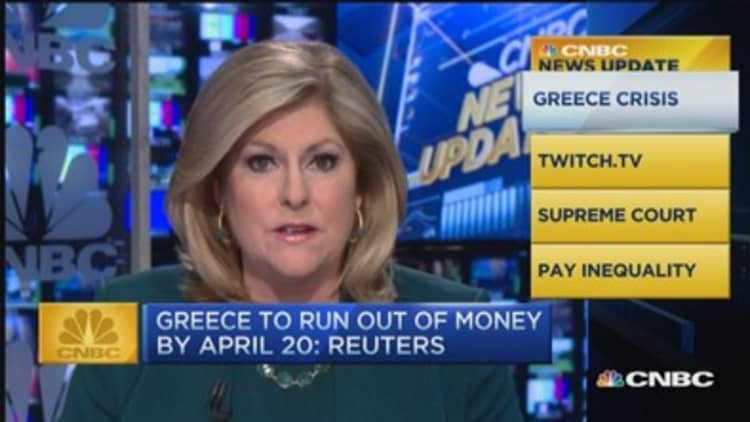Greek companies and households pulled €7.6 billion out of their bank accounts during the government's standoff with its international bailout creditors in February, driving deposits down to €140.5 billion — the lowest level in 10 years.
Although the withdrawals were lower than in January, the €20.4 billion pulled out over the two months shows how close Greece came to a full-scale bank run before Athens reached agreement with eurozone authorities to extend its €172 billion bailout into June.
The two-month total, reported by the Bank of Greece on Thursday, is even larger than the €15.9 billion withdrawn by companies and households in May and June 2012, when back-to-back Greek elections led eurozone officials to prepare actively for a Greek exit from the single currency.

Originally, Greece's EU rescue program was due to expire at the end of February. Repeated failures by the new Greek government to reach agreement with eurozone creditors led to a rapid speeding up of capital flight. Officials said that in the days before an extension deal was reached, almost €800 million was being withdrawn from Greek banks every day.
Jeroen Dijsselbloem, the Dutch finance minister who led eurozone negotiations with Athens, told the Financial Times last month that the massive withdrawals were the primary force pushing the Greek government towards an extension deal.
Read MoreBarroso: Greece should blame itself
"Mainly, the situation in the banks was becoming very urgent, and that was the biggest driver," said Mr Dijsselbloem. "If you have large outflows from your banks, you can do that for a couple of weeks, but there becomes a point where it becomes too critical."
Greek authorities have said that deposits returned to the banking sector after the deal was reached on February 20. This may have made the newly released data less dire than originally feared.
More from The Financial Times:
Russia besieged by 'hostile forces', warns Vladimir Putin
Data show how Greek bank run loomed before bailout extension deal
Obama backs crackdown on payday lenders
But Greek bankers said withdrawals have picked up again in recent weeks as the prospect of Athens running out of money to pay its bills has returned. Last week, almost €400 million per day was being withdrawn, said senior bankers.
Without a quick deal with bailout lenders, Athens may not have enough cash to pay €1.7 billion in wages and pensions at the end of the month and make a €450 million repayment to the International Monetary Fund on April 9.
Eurozone authorities have long feared that a bank run would be the most likely route to an accidental "Grexit".
If withdrawals become so large that Greek banks are deemed insolvent, the European Central Bank would have to end its practice of allowing emergency loans to lenders to fund day-to-day operations. The only way to restart the banking system would be for Greece to print its own currency.

